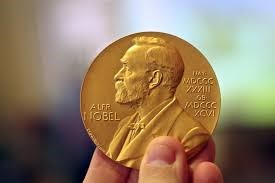Nobels, Guns and Money
By Chris M. Barkley
NOBELS
For several years, literary critics had been putting the Nobel’s Literature committee’s feet to the fire (and I count myself among the match lighters) on their long exclusion of American writers. Since they threw us a huge (and oddly shaped) bone last year in naming Bob Dylan, the consensus was that another American was probably not in the cards. Meaning Harlan Ellison, Joyce Carol Oates, Philip Roth, Louise Erdrich, Don DiLillo other perennial Nobel benchwarmers will have to wait until next year. (SIDE NOTE to the Nobel Literature Committee: You KNOW there is absolutely NOTHING stopping you from awarding more than one person in this category every year, right? One woman, one man. Two women. Two men. Just Sayin’.)
And the winner of the 2017 Nobel Prize in Literature is…Kazou Ishiguro from the United Kingdom!
Mr. Ishiguro’s anointment to the highest level of literary immortality is well deserved and we in the f&sf community should enthusiastically applaud him.
Well, yeah, with a few pointed qualifiers, which I am more than happy to provide for you.
Mr. Ishiguro’s 2005 novel Never Let Me Go is a dystopia tinged novel set in our near future. It received generally good reviews and was shortlisted for the Booker Prize, National Book Critics Circle Award and, (SURPRISE!), the 2006 Arthur C. Clarke Award. Upon the 2011 release of the film in the UK, he was quoted in The Herald of Scotland saying, “It’s almost like they’ve given us older writers license to use it [science fiction]. Before, it was ghettoized and stigmatized. For years there has been a prejudice towards sci-fi writing, which I think has been to the loss of the literary world, and not vice versa. But with things like graphic novels now, people are taking it seriously.”
Which was very gracious of Mr. ishiguro. That is, until he then qualified his statement later in the interview with, “In truth, the sci-fi label is misleading, says Ishiguro. ‘I’m just wary like everybody else that it’ll bring in the wrong audience with the wrong expectations.”
I confess to be a little puzzled by this attitude since, if he truly felt that way about sf, he had every opportunity to decline the Clarke nomination.
In any event, it was the publication of The Buried Giant in 2015 that brought Ishiguro into direct conflict with our very own Ursula K. Le Guin when, in an interview with the New York Times, pronounced his novel, an Arthurian era set tale complete with ogres and a dragon, was NOT a fantasy. “I don’t know what’s going to happen. Will readers follow me into this? Will they understand what I’m trying to do, or will they be prejudiced against the surface elements? Are they going to say this is fantasy?”
This drew the ire of Le Guin, who tartly replied:
Well, yes, they probably will. Why not? It appears that the author takes the word for an insult. To me that is so insulting, it reflects such thoughtless prejudice, that I had to write this piece in response. Fantasy is probably the oldest literary device for talking about reality… No writer can successfully use the ‘surface elements’ of a literary genre — far less its profound capacities — for a serious purpose, while despising it to the point of fearing identification with it. I found reading the book painful. It was like watching a man falling from a high wire while he shouts to the audience, “Are they going say I’m a tight-rope walker?’”
To be fair, The Buried Giant is Mr. Ishiguro’s work; if he does not want to call it a fantasy, it’s his call. However, in doing so he does what most “mainstream” writers do when they publish a work that is perceived as “genre fiction”, either vehemently deny it and incessantly worry how their peers will react, their standing with literary critics and how it will affect their career.
Literary snobbery, whether it is perpetrated by the literary establishment or the rest of us on the outside looking in at them, does not help the cause of literature. Congratulations are in order for Mr. Ishiguro; he may have written two “genre novels” but he still managed to win the Nobel Prize in literature. I sincerely wish I could forward the following view from one of his esteemed American colleagues, Michael Chabon, taken from an interview with WIRED Magazine in 2012:
One of the points I was trying to make in those McSweeney’s anthologies, and in the introductions I wrote for those, is that it was not even 100 years ago — and certainly as long ago as 150 years ago — when all kinds of incredibly important work was being done by writers in France, and England, and Russia, and Germany. The great European literary 19th-century tradition is a genre tradition, and it’s unmistakably, unashamedly, unabashedly in the works of the greatest writers of the 19th century. You find sea stories, and ghost stories, and adventure stories, and early forms of proto-science fiction and fantasy, across the board.
And that kind of boundarylessness, or literary realms where the boundaries are very porous and indistinct and can be reconfigured at will, is much more interesting and appealing to me as a writer than a world where the categories are really set and really distinct, and the boundaries are really high, and people have to stay where they start, and can’t move out of those categories. I mean, that’s just inherently deathly. And the reasons why it changed are bad reasons, they’re economic and financial and marketing kinds of reasons, and they have to do with snobbery and academic laziness. I mean, there are almost no good reasons involved for that change that took place since writers like Dickens, who wrote crime fiction and supernatural fiction as easily as social realist fiction, and often all in the same story.
A final word to the Nobel Committee: a literary work should be judged on its own merits, not the “genre” of literature it is arbitrarily assigned to by people who make it their business to discriminate and squash it.
GUNS
“An armed society is a polite society. Manners are good when one may have to back up his acts with his life.”
Robert Anson Heinlein (Beyond This Horizon, 1948)
The day after the Las Vegas Massacre, Monday, October 2 was a very emotional for me. Two fans I know well were in Las Vegas. Both of them (whom I am not naming due to privacy concerns) marked themselves safe on Facebook within 24 hours.
I’ve only held a real firearm in my hands only twice in my lifetime and by an astonishing coincidence, both guns were WWII era German Lugers. (It’s a long story. Ask me about it some other time.)
At the moment, I have no desire to own a gun. I don’t want to take anyone’s legally owned guns away from them (unless it warranted). I would be willing the pick up a firearm to defend myself, my family, my friends and my country if I were called upon to do so. I also have an incredible amount of respect for what they can do in the hands of a skilled professional and a pathological fear of what can happen in practically anyone’s else’s.
Libertarians and gun enthusiasts love Robert Heinlein’s quote because it simply purports that the presence of a firearm in everyone’s hand insures harmony amongst everyone. Well, THAT may work in a novel but when you apply this maxim to real life and real people, you quickly discern that this isn’t a dream scenario; it is America’s ongoing nightmare.
The NRA and their supporters, lobbyists, apologists and sycophants are creating a dystopia of fear in this country. They want the wearing of firearms in public everywhere to become a social norm in all fifty states and territories. They advocate this “utopian” goal in spite of five thousand years of recorded human stupidity regarding the widespread human use of weapons and armaments all over the world.
And when an individual fires into an unsuspecting crowd of twenty thousand people, kills fifty-eight and wounds over five hundred, something unusual happened. The gun lobby, finally alarmed at the massive casualties in Las Vegas, blinked. Three days after the tragedy, the NRA signaled that “bump stock’ devices, which convert semi-automatics into automatic weapons, should be subject to “further regulation”. Needless to say, gun enthusiasts nationwide started a run on bump stocks before they are banned.
Now the cynic in me thinks that the real reason for this tiny bit of capitulation on their part is because of the hue and cry from all sides of the political spectrum, including some of their most ardent supporters, and that the use of bumps stocks were the primary reason so many were killed and injured. They are deathly afraid (pun intended) that this will be the incident that will lead directly to the banning of the most popular semi-automatic sold in the US, the AR-15.
My inner cynic also feels that if the gun lobby were truly serious about promoting gun safety over gun rights, something would have been done after another crazed person cut down twenty children and six school teachers in cold blood back in 2012. And if they were truly interested in promoting public safety and responsible gun ownership, their response about regulating bump stocks and its use at the Las Vegas massacre should have taken twelve hours, not three days.
But the gun culture has progressed so far and deep into the American psyche, outright prohibition is out of the question. We all know what happened when we tried a constitutional ban on alcohol. It solved nothing and caused unintended consequences we’re still dealing with today.
The best, practical, common sense goal is to make those who would want to purchase a gun at a certain point in the future more responsible for their weapons and their actions.
The minimum we should require of a purchaser would be a mandatory waiting period, say 72 hours, should be established for any purchase, along with some proof that each weapon is insured for loss and liability. In addition, there should be some mandatory certification or a state issued license that the purchaser has undergone firearms training.
Whether progressives, liberals and gun control advocates like it or not, we are awash in guns and the only thing concerned citizens can do now is to pursue a course of moderation and hope we gradually come to our senses.
I would like to think that Robert Heinlein would approve.
…And MONEY
Rose-Marie Lillian has a BIG problem and she is sorely in need of your HELP!. Her mother, Nita Green, passed away in April 2015. Her intent, as stated in her will, was to have her only daughter inherit a logical percentage of her worldly goods. Rose-Marie was promised Nita’s collection of original paintings by Frank Kelly Freas, a legendary, multiple Hugo Award winning artist and long-time personal friend of them both. Rose-Marie lived with and cared for her mother and stepfather for the last two years of her mother’s life. Since Nita’s death, she has been denied her inheritance, despite the stated wishes of her mother and an agreement made at a legal deposition in December 2016. At this point, she has no recourse but to sue. Though her husband (the esteemed fan writer and multiple Hugo nominee, Guy Lillian III) is an attorney, he is licensed in Louisiana and her cause of action is in Florida. All attorneys rightly require retainers before beginning representation and the urgent need now is to obtain funds to pay it.
Rose-Marie turns to you for help.
The retainer required will fall between $5,000 and $7,500. She also has past legal bills incurred in this matter to cover, and future expenses to bear. Funds are needed as soon as possible to move this long-delayed case forward and to help bring Nita Green’s last wishes for her daughter to reality. Meticulous accounting of all donations will be kept and a strict account of expenditures supplied.
Rose-Marie Lillian is a longtime member of our sf community in good standing and deserves our BEST EFFORTS!
I can personally vouch for her; I LIKE her so much I once gave her a Justice League of America sweatshirt, which she proudly wears occasionally.
CAN YOU HELP? DO SO TODAY by going to the link below! THANK YOU!




